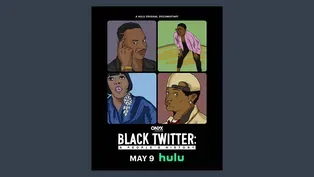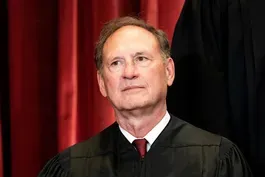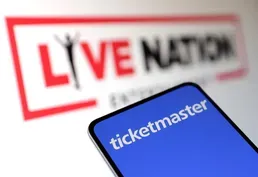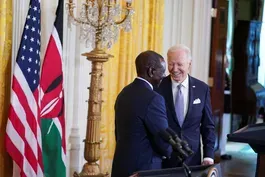
Supreme Court rejects South Carolina gerrymandering claim
Clip: 5/23/2024 | 5m 27sVideo has Closed Captions
Supreme Court rejects racial gerrymandering claim in South Carolina
The Supreme Court struck down a challenge to a congressional map in South Carolina that civil rights groups argued was a racial gerrymander. In a 6-3 decision, the conservative majority delivered a win to Republicans who said they used politics, not race, as the key factor when drawing the district bounds. Geoff Bennett discussed the decision with NewsHour Supreme Court analyst Marcia Coyle.
Problems with Closed Captions? Closed Captioning Feedback
Problems with Closed Captions? Closed Captioning Feedback
Major corporate funding for the PBS News Hour is provided by BDO, BNSF, Consumer Cellular, American Cruise Lines, and Raymond James. Funding for the PBS NewsHour Weekend is provided by...

Supreme Court rejects South Carolina gerrymandering claim
Clip: 5/23/2024 | 5m 27sVideo has Closed Captions
The Supreme Court struck down a challenge to a congressional map in South Carolina that civil rights groups argued was a racial gerrymander. In a 6-3 decision, the conservative majority delivered a win to Republicans who said they used politics, not race, as the key factor when drawing the district bounds. Geoff Bennett discussed the decision with NewsHour Supreme Court analyst Marcia Coyle.
Problems with Closed Captions? Closed Captioning Feedback
How to Watch PBS News Hour
PBS News Hour is available to stream on pbs.org and the free PBS App, available on iPhone, Apple TV, Android TV, Android smartphones, Amazon Fire TV, Amazon Fire Tablet, Roku, Samsung Smart TV, and Vizio.
Providing Support for PBS.org
Learn Moreabout PBS online sponsorshipGEOFF BENNETT: The U.S. Supreme Court ruled today that South Carolina Republicans did not unlawfully consider race when drawing a district that removed thousands of Black voters.
In a 6-3 decision, the court's conservative majority delivered a win to GOP state officials who said they used politics, not race, as the key factor when drawing the district boundaries.
The decision could have major implications for future cases looking at racial representation in congressional maps.
Our Supreme Court watcher, Marcia Coyle, joins us now.
It's great to have you here, as always, Marcia.
MARCIA COYLE: Good to be here, Geoff.
GEOFF BENNETT: So the majority opinion was written by Justice Samuel Alito, part of which reads: "No direct evidence supports the district court's finding that race predominated in the design of District 1."
It continues: "The circumstantial evidence falls far short of showing that race, not partisan preferences, drove the districting process."
Explain the decision here, how they arrived at it.
MARCIA COYLE: These are complex cases because of the close link between race and political party.
And the challengers had to unwind that to show that race predominated.
That's the test under the 14th Amendment.
If race predominates, it's -- the plan is unconstitutional.
And the trial court had a nine-day trial, hundreds of exhibits, witnesses, and had findings of fact that this district plan was unconstitutional.
And Justice Alito, in the majority opinion, which the court reviews for clear error -- was the trial judge's fact-finding clearly erroneous?
He said it was.
And he disputed all the evidence.
But there -- Jeff, there were two things he said that were sort of new here, very new here.
He said, one, that the trial court only paid lip service to a presumption of good faith on the part of the state legislature that drew the map.
And also, he said that if you don't have direct evidence, if you don't have a smoking gun, you have to show an alternative map -- the challengers have to show an alternative map that keeps the partisan benefits that the state was seeking and a better racial balance.
And they didn't, because the district court didn't require it at the time.
The dissent led by Justice Kagan said that Justice Alito, in the majority opinion, had turned upside down the court's clear error analysis, that, when trial judges engage in fact-finding like this, the court gives heavy deference to the trial court's fact-finding, because they're there.
They see the witnesses.
It's a different way of analyzing these cases.
It will make it much harder for challengers to what they consider racial gerrymanders in the future.
GEOFF BENNETT: I want to ask you about that, because our team spoke with Leah Aden of the NAACP Legal Defense Fund.
She argued this case before the court, and she and other advocates say that this case is textbook racial gerrymandering.
LEAH ADEN, NAACP Legal Defense Fund: More than 30,000 black Charlestonians were bleached out of Congressional District 1 and moved into neighboring Congressional District 6, which was already serving as a functional district for black voters.
That harms black Charlestonians who were bleached out, because they continue to live and work along the coastal South Carolina and they continue to need representatives who will speak to their needs.
GEOFF BENNETT: So she and other advocates make the point that it will be easier for partisan map makers to draw congressional maps that disfavor black voters so long as they show that they're focused on politics and not race.
MARCIA COYLE: It's important to note that the court's conservative majority has for some time now, and Justice Alito, in particular, they have been making it more difficult for challengers to racial gerrymanders and also to challenges under the Voting Rights Act Section 2.
In fact, Justice Alito wrote an opinion very recently in an Arizona case in which he set up a whole new structure for Section 2 challenges.
And so it's just going to be more difficult.
GEOFF BENNETT: While you're here, I want to ask you about the Supreme Court's latest ethics controversy, given this reporting by The New York Times that this Appeal to Heaven flag was seen flying outside Justice Alito's vacation home.
That comes on the heels of earlier New York Times reporting that an inverted American flag was seen flying outside his home after the election.
These are symbols that are used by insurrectionists and by election deniers, also a lot of ethics questions around Clarence Thomas.
What does the frequency and significance of these incidents say about the court's impartiality and the justices obligation to at least appear neutral?
MARCIA COYLE: Geoff, I had to say, when I saw the flag, the two flags, I wanted to call Justice Alito up and say, what were you thinking?
Because it's just something -- it's incomprehensible.
I think of Chief John Roberts and Justice Kagan as -- until I hear otherwise, as examples of being so careful about where they deliver speeches, where they appear, what they do.
And yet Justice Thomas and Justice Alito recently with these reports just -- and no real response to what's happening, appear impervious to how the public might be viewing it.
GEOFF BENNETT: Marcia Coyle, it's always a pleasure to draw on your insights.
Thanks so much.
MARCIA COYLE: My pleasure, Geoff.
'Black Twitter' documentary explores its cultural impact
Video has Closed Captions
'Black Twitter' documentary explores its history and cultural impact (7m 36s)
College leaders grilled over handling of campus protests
Video has Closed Captions
College leaders grilled by lawmakers in hearing over handling of campus protests (5m 2s)
Controversial flag flown at Alito's beach house, report says
Video has Closed Captions
Flag associated with Christian nationalism flown at Alito's beach house, report says (6m 44s)
DOJ files antitrust suit against Ticketmaster, Live Nation
Video has Closed Captions
Ticketmaster, Live Nation a monopoly that should be broken up, Justice Department alleges (6m 23s)
Invasive goldfish threaten Great Lakes ecosystem
Video has Closed Captions
How massive, feral goldfish are threatening the Great Lakes ecosystem (6m 6s)
News Wrap: U.S. to designate Kenya as a major non-NATO ally
Video has Closed Captions
News Wrap: Biden plans to designate Kenya as a major non-NATO U.S. ally (5m 3s)
U.S. may allow Ukraine to use American weapons inside Russia
Video has Closed Captions
U.S. may lift ban on Ukraine using American-supplied weapons to strike inside Russia (9m 44s)
Providing Support for PBS.org
Learn Moreabout PBS online sponsorshipSupport for PBS provided by:
Major corporate funding for the PBS News Hour is provided by BDO, BNSF, Consumer Cellular, American Cruise Lines, and Raymond James. Funding for the PBS NewsHour Weekend is provided by...


















